小学英语近义词辨析
英语常考近义词成语辨析100组

英语常考近义词成语辨析100组1. 喜欢 vs. 爱好 - 指对某一事物或活动的有好感或偏爱。
2. 开心 vs. 快乐 - 表示愉快的心情。
3. 困惑 vs. 迷惑 - 表示对某事情感到疑惑或莫名其妙。
4. 同情 vs. 同情心 - 表示对他人的困难或苦难感到理解和关切。
5. 感激 vs. 感谢 - 表示对别人的帮助或恩惠表示谢意。
6. 独特 vs. 特殊 - 表示与众不同或与常规不同。
7. 敏捷 vs. 灵活 - 表示动作或思维的迅捷程度。
8. 忠诚 vs. 诚实 - 表示对某人或某事的忠心和坦诚。
9. 本领 vs. 能力 - 表示某种技能或才能。
10. 合理 vs. 公正 - 表示合乎逻辑或公平正义。
11. 危险 vs. 风险 - 表示存在威胁或可能带来危险的情况。
12. 政府 vs. 政权 - 表示治理国家的机构或组织。
13. 友谊 vs. 友情 - 表示朋友之间的情感和关系。
14. 丰富 vs. 富裕 - 表示财富或资源充足。
15. 智慧 vs. 聪明 - 表示智力水平较高或思维敏捷。
16. 关注 vs. 关心 - 表示对某事物或某人的关注和关心。
17. 反对 vs. 抵制 - 表示不支持或反抗某一事物或行为。
18. 容易 vs. 简单 - 表示易于做到或理解。
19. 紧张 vs. 担忧 - 表示焦虑或担忧的情绪。
20. 信任 vs. 依赖 - 表示对某人或某事物的信心或依赖。
21. 目标 vs. 任务 - 表示需要完成的工作或目标。
22. 利益 vs. 好处 - 表示从某事物中获得的利益或好处。
23. 减少 vs. 缩小 - 表示数量或规模的减少。
24. 批评 vs. 指责 - 表示对某人或某事物的不满或责备。
25. 传统 vs. 习俗 - 表示某一群体传承下来的风俗或习惯。
26. 科学 vs. 学问 - 表示知识体系或某一学科的研究。
27. 知识 vs. 智慧 - 表示学习和了解的内容和能力。
小学六年级英语同义词(毕业生必看)
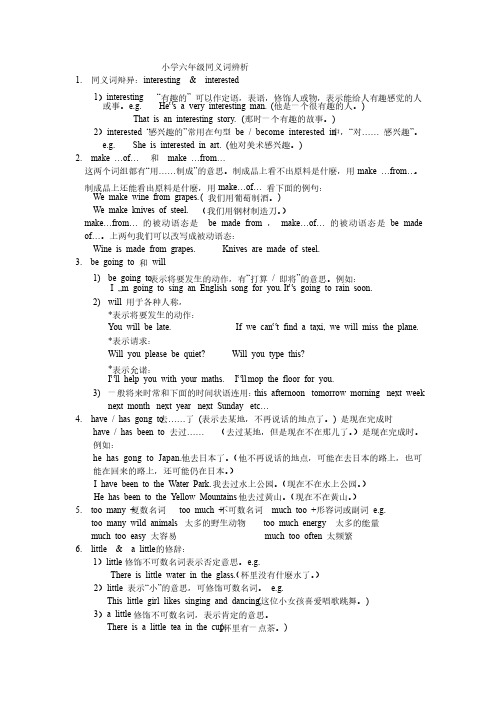
小学六年级同义词辨析小学六年级同义词辨析1. 同义词辩异:interesting & interested 1)interesting “有趣的” 可以作定语,表语,修饰人或物,表示能给人有趣感觉的人或事。
e.g. He‟s a very interesting man. (他是一个很有趣的人。
) That is an interesting story. (那时一个有趣的故事。
) 2)interested “感兴趣的”常用在句型常用在句型 be / become interested in 中,“对…… 感兴趣”。
e.g. She is interested in art. (他对美术感兴趣。
) 2. make …of… 和 make …from…这两个词组都有“用……制成”的意思。
制成品上看不出原料是什麽,用make …from…。
制成品上还能看出原料是什麽,用make…of… 看下面的例句:看下面的例句:We make wine from grapes. ( 我们用葡萄制酒。
) We make knives of steel. (我们用钢材制造刀。
)make…from… 的被动语态是的被动语态是 be be made made made from from , make…of… 的被动语态是的被动语态是 be be made made of…。
上两句我们可以改写成被动语态:。
上两句我们可以改写成被动语态:Wine is made from grapes. Knives are made of steel. 3. be going to 和 will 1) be going to 表示将要发生的动作,有“打算打算 / 即将”的意思。
例如:的意思。
例如:I …m going to sing an English song for you. It‟s going to rain soon.2) will 用于各种人称,用于各种人称,*表示将要发生的动作:表示将要发生的动作:You will be late. If we can‟t find a taxi, we will miss the plane.*表示请求:表示请求:Will you please be quiet? Will you type this? *表示允诺:表示允诺:I‟ll help you with your maths. I‟ll mop the floor for you. 3) 一般将来时常和下面的时间状语连用:this afternoon tomorrow morning next week next month next year next Sunday etc…4. have / has gong to 去……了 (表示去某地,不再说话的地点了。
英语近义词辨析
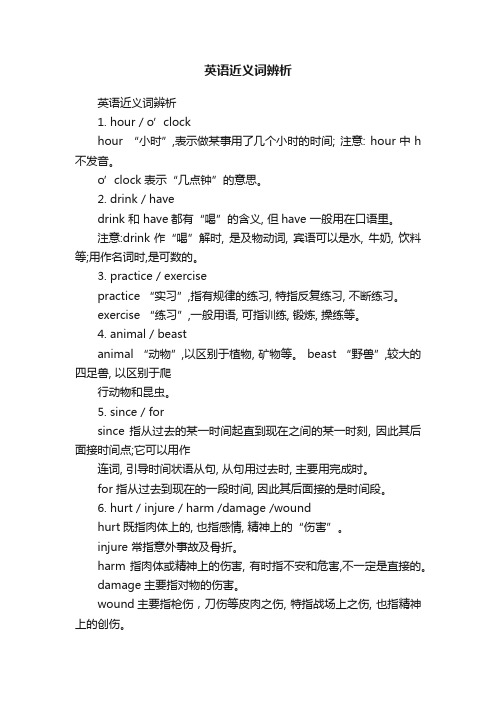
英语近义词辨析英语近义词辨析1. hour / o’clockhour “小时”,表示做某事用了几个小时的时间; 注意: hour中h 不发音。
o’clock表示“几点钟”的意思。
2. drink / havedrink 和 have都有“喝”的含义, 但have 一般用在口语里。
注意:drink作“喝”解时, 是及物动词, 宾语可以是水, 牛奶, 饮料等;用作名词时,是可数的。
3. practice / exercisepractice “实习”,指有规律的练习, 特指反复练习, 不断练习。
exercise “练习”,一般用语, 可指训练, 锻炼, 操练等。
4. animal / beastanimal “动物”,以区别于植物, 矿物等。
beast “野兽”,较大的四足兽, 以区别于爬行动物和昆虫。
5. since / forsince 指从过去的某一时间起直到现在之间的某一时刻, 因此其后面接时间点;它可以用作连词, 引导时间状语从句, 从句用过去时, 主要用完成时。
for 指从过去到现在的一段时间, 因此其后面接的是时间段。
6. hurt / injure / harm /damage /woundhurt既指肉体上的, 也指感情, 精神上的“伤害”。
injure 常指意外事故及骨折。
harm 指肉体或精神上的伤害, 有时指不安和危害,不一定是直接的。
damage主要指对物的伤害。
wound主要指枪伤,刀伤等皮肉之伤, 特指战场上之伤, 也指精神上的创伤。
7. appoint / assign / nameappoint “任命”,指不经选举, 由当权者经过仔细考虑以后作出委派, 分配。
assign “指派”,指分配, 分派工作。
name “任命”,指宣布任命。
注意family name是(英美人姓名中的)姓, first name (美国常作given name )是名字, 是出生时父母给取的。
小学英语近义词_反义词_同音词辨析和练习
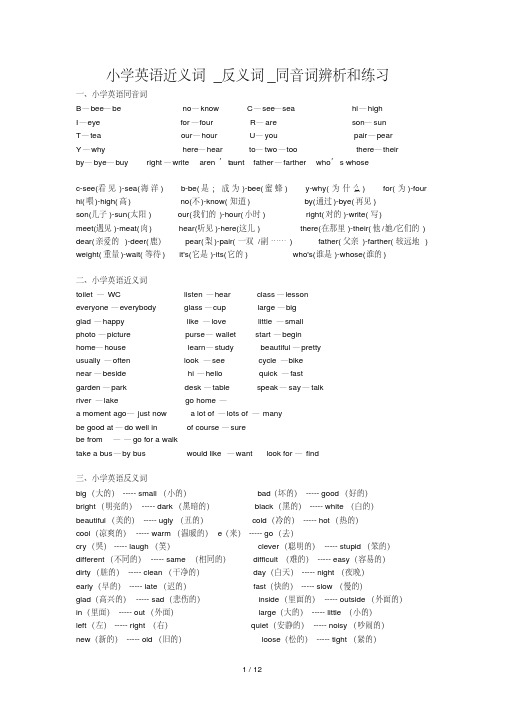
小学英语近义词_反义词_同音词辨析和练习一、小学英语同音词B—bee—be no—know C—see—sea hi—highI—eye for—four R—are son—sunT—tea our—hour U—you pair—pearY—why here—hear to—two—too there—theiraunt father—farther who’s—whoseby—bye—buy right—write aren’t—c-see(看见)-sea(海洋) b-be(是;成为)-bee(蜜蜂) y-why(为什么) for(为)-four hi(喂)-high(高) no(不)-know(知道) by(通过)-bye(再见)son(儿子)-sun(太阳) our(我们的)-hour(小时) right(对的)-write(写)meet(遇见)-meat(肉) hear(听见)-here(这儿) there(在那里)-their(他/她/它们的) dear(亲爱的)-deer(鹿)pear(梨)-pair(一双/副……) father(父亲)-farther(较远地) weight(重量)-wait(等待) it's(它是)-its(它的) who's(谁是)-whose(谁的)二、小学英语近义词toilet — WC listen —hear class —lessoneveryone —everybody glass —cup large —bigglad —happy like —love little —smallphoto —picture purse— wallet start —beginhome—house learn—study beautiful—prettyusually —often look —see cycle —bikenear —beside hi —hello quick —fastgarden —park desk —table speak —say —talkriver —lake go home —a moment ago— just now a lot of —lots of — manybe good at —do well in of course —surebe from ——go for a walktake a bus —by bus would like —want look for— find三、小学英语反义词big(大的)----- small(小的)bad(坏的)----- good(好的)bright(明亮的)----- dark(黑暗的)black(黑的)----- white(白的)beautiful(美的)----- ugly(丑的)cold(冷的)----- hot(热的)cool(凉爽的)----- warm(温暖的)e(来)----- go(去)cry(哭)----- laugh(笑)clever(聪明的)----- stupid(笨的)different(不同的)----- same (相同的)difficult(难的)----- easy(容易的)dirty(脏的)----- clean(干净的)day(白天)----- night(夜晚)early(早的)----- late(迟的)fast(快的)----- slow(慢的)glad(高兴的)----- sad(悲伤的)inside(里面的)----- outside(外面的)in(里面)----- out(外面)large(大的)----- little(小的)left(左)----- right(右)quiet(安静的)----- noisy(吵闹的)new(新的)----- old(旧的)loose(松的)----- tight(紧的)like(喜欢)----- hate(厌恶)open(开)----- close(关)quick(快的)----- slow(慢的)stand(站)----- sit(坐)short(矮的)----- tall(高的)short(短的)----- long(长的)thick(厚的)----- thin(薄的)thin(瘦的)----- fat(肥的)up(向上)------ down(向下)wrong(错的)----- right(对的)weak(弱的)----- strong(强壮的)young(年轻的)----- old(年老的练习:一、找出划线部分读音不同的单词( ) 1. A. clock B. box C. go D. doctor( ) 3. A. Tuesday B. Saturday C. today D. Thursday( ) 4. A. this B. they C. Maths D. there( ) 5. A. Friday B. like C. Science D. trick( ) 6. A. have B. about C. Maths D. Saturday三、按要求写单词1.have(现在分词)2.one(序数词)3.new(反义词)4.this(复数)5.this(反义词)6.have(第三人称单数)7.interest(形容词) 8.many(比较级) 9.we(宾格) (所有格)10.I(宾格) (所有格) 11.you(宾格) (所有格)12.they(宾格) (所有格) 13.she(宾格) (所有格)14.he(宾格) (所有格) 15.boy(复数) 16.family(复数)17.do(第三人称单数) 18.study(的三人称单数) 19.two(序数词) 20.three(序数词) 21.hot(反义词) 22.minus(反义词)23.I(同音词) 24.you(同音字母) 25.They’re(完全形式)四、根据要求写句子对画线部分提问)1. It’s Sunday.(2. I like English.(对画线部分提问)3. We have eight subjects this term.(对画线部分提问)4. We have Chinese, English, Maths and Science every morning.(对画线部分提问)5. the, lesson, it, on, first, is, Monday . (连词成句)6. Miss Li and her students are having a lesson.(改为一般疑问句,做肯定、否定回答)7. do, and, like, my, not, I, PE, brother.(连词成句)8. we, a, lessons, in, we, more, Maths, hope, have, week.(连词成句)9. He often reads English in the morning.(改为否定句)一、找出画线部分读音不同的一个单词A B C D( ) 1. over some mother puzzle( ) 2. after class start Saturday( ) 3. photo of note telephone( ) 4. orange clock today model( ) 5. wrong Wednesday week with( ) 6. family why happy sorry( ) 7. hear near heart earache( ) 8. tea great speak see三、按要求写单词1.stay(现在分词)2.wrong(反义词)3.bad(反义词)4.good(比较级)5.got(原形)6.I’m(完全形式) 完全形式) 8.hear(同音词) 9.class(复数)7.I’ve(10.take(现在分词) 11.open(反义词) 12.fine(反义词)13.fat(反义词) 14.monkey(复数) 15.let’s(完全形式)16.brother(对应词) 17.mother(对应词)四、根据要求写句子1. This is Helen speaking?(对画线部分提问) ,2. I can get some fruit for you?(改为一般疑问句,作肯定回答)3. I play football after school.(分为两句话来表达)4. I feel ill.(对画线部分提问)5. I hope you get better soon.(改为否定句)6. I’ve got a headache and a bad cough.(对划线部分提问)7. dog, wrong, your, with, is, what(?)(连词成句)8. get, sister, hope, better, your, soon, mother, I, your, and(.)(连词成句)9. Chinese, got, fever, our, a, teacher, high, has(.)(连词成句)四、辨别下列各组单词划线部分的发音,相同的打(√),不同的打(×)。
小学英语近义词_反义词_同音词辨析和练习
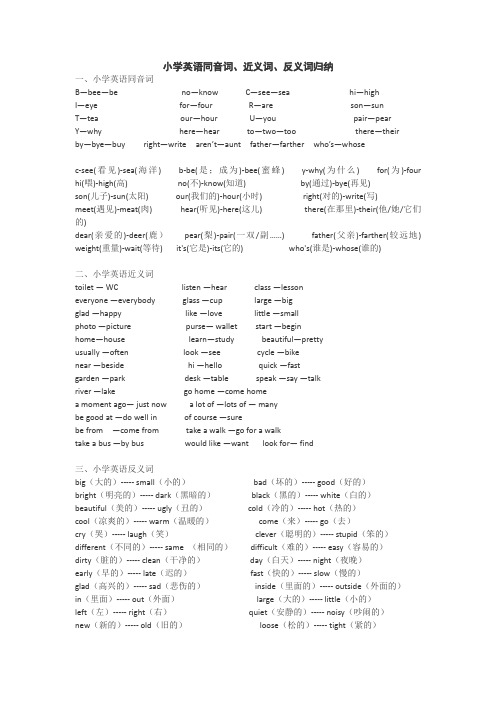
小学英语同音词、近义词、反义词归纳一、小学英语同音词B—bee—be no—know C—see—sea hi—highI—eye for—four R—are son—sunT—tea our—hour U—you pair—pear Y—why here—hear to—two—too there—their by—bye—buy right—write aren’t—aunt father—farther who’s—whosec-see(看见)-sea(海洋) b-be(是;成为)-bee(蜜蜂) y-why(为什么) for(为)-four hi(喂)-high(高) no(不)-know(知道) by(通过)-bye(再见)son(儿子)-sun(太阳) our(我们的)-hour(小时) right(对的)-write(写)meet(遇见)-meat(肉) hear(听见)-here(这儿) there(在那里)-their(他/她/它们的)dear(亲爱的)-deer(鹿)pear(梨)-pair(一双/副……) father(父亲)-farther(较远地) weight(重量)-wait(等待) it's(它是)-its(它的) who's(谁是)-whose(谁的)二、小学英语近义词toilet — WC listen —hear class —lessoneveryone —everybody glass —cup large —bigglad —happy like —love little —smallphoto —picture purse— wallet start —beginhome—house learn—study beautiful—prettyusually —often look —see cycle —bikenear —beside hi —hello quick —fastgarden —park desk —table speak —say —talkriver —lake go home —come homea moment ago— just now a lot of —lots of — manybe good at —do well in of course —surebe from —come from take a walk —go for a walktake a bus —by bus would like —want look for— find三、小学英语反义词big(大的)----- small(小的)bad(坏的)----- good(好的)bright(明亮的)----- dark(黑暗的)black(黑的)----- white(白的)beautiful(美的)----- ugly(丑的)cold(冷的)----- hot(热的)cool(凉爽的)----- warm(温暖的)come(来)----- go(去)cry(哭)----- laugh(笑)clever(聪明的)----- stupid(笨的)different(不同的)----- same (相同的)difficult(难的)----- easy(容易的)dirty(脏的)----- clean(干净的)day(白天)----- night(夜晚)early(早的)----- late(迟的)fast(快的)----- slow(慢的)glad(高兴的)----- sad(悲伤的)inside(里面的)----- outside(外面的)in(里面)----- out(外面)large(大的)----- little(小的)left(左)----- right(右)quiet(安静的)----- noisy(吵闹的)new(新的)----- old(旧的)loose(松的)----- tight(紧的)like(喜欢)----- hate(厌恶)open(开)----- close(关)quick(快的)----- slow(慢的)stand(站)----- sit(坐)short(矮的)----- tall(高的)short(短的)----- long(长的)thick(厚的)----- thin(薄的)thin(瘦的)----- fat(肥的)up(向上)------ down(向下)wrong(错的)----- right(对的)weak(弱的)----- strong(强壮的)young(年轻的)----- old(年老的练习:一、找出划线部分读音不同的单词( ) 1. A. clock B. box C. go D. doctor( ) 2. A. computer B. much C. subject D. Sunday( ) 3. A. Tuesday B. Saturday C. today D. Thursday( ) 4. A. this B. they C. Maths D. there( ) 5. A. Friday B. like C. Science D. trick( ) 6. A. have B. about C. Maths D. Saturday三、按要求写单词(现在分词) (序数词) (反义词)(复数) (反义词) (第三人称单数)(形容词) (比较级) (宾格) (所有格)(宾格) (所有格) (宾格) (所有格)(宾格) (所有格) (宾格) (所有格)(宾格) (所有格) (复数) (复数)(第三人称单数) (的三人称单数) (序数词)(序数词) (反义词) (反义词)(同音词) (同音字母) ’re(完全形式)四、根据要求写句子1. It’s Sunday.(对画线部分提问)2. I like English.(对画线部分提问)3. We have eight subjects this term.(对画线部分提问)4. We have Chinese, English, Maths and Science every morning.(对画线部分提问)5. the, lesson, it, on, first, is, Monday . (连词成句)6. Miss Li and her students are having a lesson.(改为一般疑问句,做肯定、否定回答)7. do, and, like, my, not, I, PE, brother.(连词成句)8. we, a, lessons, in, we, more, Maths, hope, have, week.(连词成句)9. He often reads English in the morning.(改为否定句)一、找出画线部分读音不同的一个单词A B C D( ) 1. over some mother puzzle( ) 2. after class start Saturday( ) 3. photo of note telephone( ) 4. orange clock today model( ) 5. wrong Wednesday week with( ) 6. family why happy sorry( ) 7. hear near heart earache( ) 8. tea great speak see三、按要求写单词(现在分词) (反义词) (反义词)(比较级) (原形) ’m(完全形式)’ve(完全形式) (同音词) (复数)(现在分词) (反义词) (反义词)(反义词) (复数) ’s(完全形式)(对应词) (对应词)四、根据要求写句子1. This is Helen speaking(对画线部分提问) ,2. I can get some fruit for you(改为一般疑问句,作肯定回答)3. I play football after school.(分为两句话来表达)4. I feel ill.(对画线部分提问)5. I hope you get better soon.(改为否定句)6. I’ve got a headache and a bad cough.(对划线部分提问)7. dog, wrong, your, with, is, what()(连词成句)8. get, sister, hope, better, your, soon, mother, I, your, and(.)(连词成句)9. Chinese, got, fever, our, a, teacher, high, has(.)(连词成句)四、辨别下列各组单词划线部分的发音,相同的打(√),不同的打(×)。
小学英语近义词_反义词_同音词辨析和练习
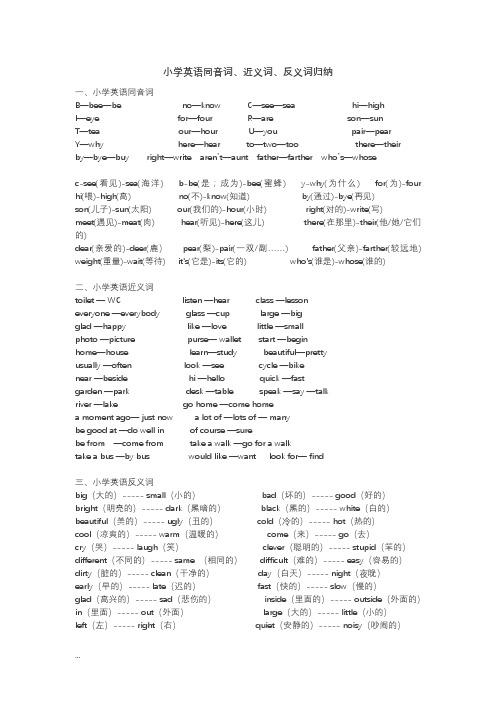
小学英语同音词、近义词、反义词归纳一、小学英语同音词B—bee—be no—know C—see—sea hi—highI—eye for—four R—are son—sunT—tea our—hour U—you pair—pearY—why here—hear to—two—too there—their by—bye—buy right—write aren’t—aunt father—farther who’s—whosec-see(看见)-sea(海洋) b-be(是;成为)-bee(蜜蜂) y-why(为什么) for(为)-four hi(喂)-high(高) no(不)-know(知道) by(通过)-bye(再见)son(儿子)-sun(太阳) our(我们的)-hour(小时) right(对的)-write(写)meet(遇见)-meat(肉) hear(听见)-here(这儿) there(在那里)-their(他/她/它们的)dear(亲爱的)-deer(鹿) pear(梨)-pair(一双/副……) father(父亲)-farther(较远地) weight(重量)-wait(等待) it's(它是)-its(它的) who's(谁是)-whose(谁的)二、小学英语近义词toilet — WC listen —hear class —lessoneveryone —everybody glass —cup large —bigglad —happy like —love little —smallphoto —picture purse— wallet start —beginhome—house learn—study beautiful—prettyusually —often look —see cycle —bikenear —beside hi —hello quick —fastgarden —park desk —table speak —say —talkriver —lake go home —come homea moment ago— just now a lot of —lots of — manybe good at —do well in of course —surebe from —come from take a walk —go for a walktake a bus —by bus would like —want look for— find三、小学英语反义词big(大的)----- small(小的) bad(坏的)----- good(好的)bright(明亮的)----- dark(黑暗的) black(黑的)----- white(白的)beautiful(美的)----- ugly(丑的) cold(冷的)----- hot(热的)cool(凉爽的)----- warm(温暖的) come(来)----- go(去)cry(哭)----- laugh(笑) clever(聪明的)----- stupid(笨的)different(不同的)----- same (相同的) difficult(难的)----- easy(容易的)dirty(脏的)----- clean(干净的) day(白天)----- night(夜晚)early(早的)----- late(迟的) fast(快的)----- slow(慢的)glad(高兴的)----- sad(悲伤的) inside(里面的)----- outside(外面的)in(里面)----- out(外面) large(大的)----- little(小的)left(左)----- right(右) quiet(安静的)----- noisy(吵闹的)new(新的)----- old(旧的) loose(松的)----- tight(紧的)like(喜欢)----- hate(厌恶) open(开)----- close(关)quick(快的)----- slow(慢的) stand(站)----- sit(坐)short(矮的)----- tall(高的) short(短的)----- long(长的)thick(厚的)----- thin(薄的) thin(瘦的)----- fat(肥的)up(向上)------ down(向下) wrong(错的)----- right(对的)weak(弱的)----- strong(强壮的) young(年轻的)----- old(年老的练习:一、找出划线部分读音不同的单词( ) 1. A. clock B. box C. go D. doctor( ) 2. A. computer B. much C. subject D. Sunday( ) 3. A. Tuesday B. Saturday C. today D. Thursday( ) 4. A. this B. they C. Maths D. there( ) 5. A. Friday B. like C. Science D. trick( ) 6. A. have B. about C. Maths D. Saturday三、按要求写单词1.have(现在分词)2.one(序数词)3.new(反义词)4.this(复数)5.this(反义词)6.have(第三人称单数)7.interest(形容词) 8.many(比较级) 9.we(宾格) (所有格)10.I(宾格) (所有格) 11.you(宾格) (所有格)12.they(宾格) (所有格) 13.she(宾格) (所有格)14.he(宾格) (所有格) 15.boy(复数) 16.family(复数)17.do(第三人称单数) 18.study(的三人称单数) 19.two(序数词)20.three(序数词) 21.hot(反义词) 22.minus(反义词)23.I(同音词) 24.you(同音字母) 25.They’re(完全形式)四、根据要求写句子1. It’s Sunday.(对画线部分提问)2. I like English.(对画线部分提问)3. We have eight subjects this term.(对画线部分提问)4. We have Chinese, English, Maths and Science every morning.(对画线部分提问)5. the, lesson, it, on, first, is, Monday . (连词成句)6. Miss Li and her students are having a lesson.(改为一般疑问句,做肯定、否定回答)7. do, and, like, my, not, I, PE, brother.(连词成句)8. we, a, lessons, in, we, more, Maths, hope, have, week.(连词成句)9. He often reads English in the morning.(改为否定句)一、找出画线部分读音不同的一个单词A B C D( ) 1. over some mother puzzle( ) 2. after class start Saturday( ) 3. photo of note telephone( ) 4. orange clock today model( ) 5. wrong Wednesday week with( ) 6. family why happy sorry( ) 7. hear near heart earache( ) 8. tea great speak see三、按要求写单词1.stay(现在分词)2.wrong(反义词)3.bad(反义词)4.good(比较级)5.got(原形)6.I’m(完全形式)7.I’ve(完全形式) 8.hear(同音词) 9.class(复数)10.take(现在分词) 11.open(反义词) 12.fine(反义词)13.fat(反义词) 14.monkey(复数) 15.let’s(完全形式)16.brother(对应词) 17.mother(对应词)四、根据要求写句子1. This is Helen speaking?(对画线部分提问) ,2. I can get some fruit for you?(改为一般疑问句,作肯定回答)3. I play football after school.(分为两句话来表达)4. I feel ill.(对画线部分提问)5. I hope you get better soon.(改为否定句)6. I’ve got a headache and a bad cough.(对划线部分提问)7. dog, wrong, your, with, is, what(?)(连词成句)8. get, sister, hope, better, your, soon, mother, I, your, and(.)(连词成句)9. Chinese, got, fever, our, a, teacher, high, has(.)(连词成句)四、辨别下列各组单词划线部分的发音,相同的打(√),不同的打(×)。
小学英语意思相近用法不同的近义词总结
小学英语意思相近用法不同的近义词总结happen , take place二者都有“发生”的意思。
happen指事情的发生,往往带有"偶然"的意思。
It happens that I am free today. 恰好今天我没有事。
take place指事先安排或策划好而后发生,没有"偶然"的意思。
must, have tomust表示说话人的主观看法;而have to则表示客观需要。
mustn t意为“不可以;不允许”;don t have to意为“不必”。
如:(1)My father had to work when he was ten years old。
(2)The play is not interesting. I really must go now。
arrive , reach , get to三者都有“到达”之意。
reach为及物动词。
They reached Tianjin yesterday.昨天他们到达天津。
arrive为不及物动词,后面接介词in或at。
get to常用于口语,可代替前二者。
because , because of二者均表示“因为”because是连词,引导状语从句。
We stayed at home because it rained. 因为下雨,我们呆在家。
because of是短语介词,后面接名词性词语。
We stayed at home because of the rain . 因为下雨,我们呆在家。
in front of, in the front ofin front of…意思是"在……前面",指甲物在乙物之前,两者互不包括;其反义词是behind(在……的后面)。
如:He walked in fount of me。
他走在我的前面。
There are some flowers in fount of the house。
小学英语近义词语辩析
小学英语近义词语辩析1. day ,dateday 和date 这两个单词都与“日子”有关。
day 表示“日子,天”时,通常是指“某一天”的意思,它还含有“节日,假日,生日”的意思。
例如:He works eight hours a day. (他一天工作8 个小时。
)They stayed in Beijing for three days. (他们在北京呆了 3 天。
)day 还可以表示“天气”。
例如:What a fine day!(多好的天气啊!)而date 通常用来指“日期,时日,年代”等,它不仅包括一般的年、月中的“日期”,而且还可以指历史上的某一“年代”或“日期”。
例如:I don't know the date of the football match. (我不知道那场足球赛的具体日期。
)Please put a date on the letter. (请在信上写明日期。
)The date of her birth is November 18,1989. (他出生于1989 年11 月18 日。
)2. real,truereal 和true 均表示“真的”的意思,都用作形容词,但real 指客观存在的、并非想像或仿照的“真的,真正的”,其副词形式为really .例如:Is this real gold?(这是真金吗?)This is a story of real life. (这是现实生活中的一个故事。
)I really don't know what to do next. (我真地不知道下一步该怎么办。
)true 意为“真的,真实的”,它表示的“真实的,确实的”是和客观事实相一致的,并非杜撰、捏造的;其副词形式为truly .例如:What he said is true. (他说的是真的。
)It is a true story. (这是一个真实的故事。
小学英语同义词辨析一
天赋英语 让英语成为你的天赋
look、see、watch say、speak、talk、tell tall、high big、large
目录
see 强调“看”的结果。look、see、watch 从窗户外面我能看到一些小山。 I can see some hills from the window.
say指说、讲,后面跟说话的内容。 东东说他很饿。
Dongdong says he is very hungry.
• talk指谈话、讲、说话。常用短语talk to/ with sb.意为“对和某人谈话”。
• 老师正在和我爸爸谈话。
• The teacher is talking with my father.
tell 指说、讲、强调给出详细描述。常用短语tell sb. sth. 意为“告诉某人某事”,tell a story意为 “讲故事”。 Grandma Li told us a story。 李奶奶给我们讲了一个故事
tall、high
• tall 指人、动物或树木的细长而高,其反义 词为short。
• Yao Ming is very tall. • high 常指物体,也多用来形容山脉,强调
物体宽而高,其反义词为low。 • Mountain Tai is very high。 • 泰山很高。
big、large
• big 较口语化,指事物面积和体积的大小,还可表 示物体的重量、人的身高。
• The box is too big. I can't carry it. • 这个箱子太大,我搬不动它。 • large 指巨大,在表示数量时用large,而不用big • He has a large number of books. • 他有许多书。
小学英语近义词_反义词_同音词辨析和练习
小学英语同音词、近义词、反义词归纳一、小学英语同音词B—bee—be no—know C—see—sea hi—highI—eye for—four R—are son—sunT—tea our—hour U—you pair—pearY—why here—hear to—two—too there—their by—bye—buy right—write aren’t—aunt father—farther who’s—whosec-see(看见)-sea(海洋) b-be(是;成为)-bee(蜜蜂) y-why(为什么) for(为)-four hi(喂)-high(高) no(不)-know(知道) by(通过)-bye(再见)son(儿子)-sun(太阳) our(我们的)-hour(小时) right(对的)-write(写)meet(遇见)-meat(肉) hear(听见)-here(这儿) there(在那里)-their(他/她/它们的)dear(亲爱的)-deer(鹿) pear(梨)-pair(一双/副……) father(父亲)-farther(较远地) weight(重量)-wait(等待) it's(它是)-its(它的) who's(谁是)-whose(谁的)二、小学英语近义词toilet — WC listen —hear class —lessoneveryone —everybody glass —cup large —bigglad —happy like —love little —smallphoto —picture purse— wallet start —beginhome—house learn—study beautiful—prettyusually —often look —see cycle —bikenear —beside hi —hello quick —fastgarden —park desk —table speak —say —talkriver —lake go home —come homea moment ago— just now a lot of —lots of — manybe good at —do well in of course —surebe from —come from take a walk —go for a walktake a bus —by bus would like —want look for— find三、小学英语反义词big(大的)----- small(小的) bad(坏的)----- good(好的)bright(明亮的)----- dark(黑暗的) black(黑的)----- white(白的)beautiful(美的)----- ugly(丑的) cold(冷的)----- hot(热的)cool(凉爽的)----- warm(温暖的) come(来)----- go(去)cry(哭)----- laugh(笑) clever(聪明的)----- stupid(笨的)different(不同的)----- same (相同的) difficult(难的)----- easy(容易的)dirty(脏的)----- clean(干净的) day(白天)----- night(夜晚)early(早的)----- late(迟的) fast(快的)----- slow(慢的)glad(高兴的)----- sad(悲伤的) inside(里面的)----- outside(外面的)in(里面)----- out(外面) large(大的)----- little(小的)left(左)----- right(右) quiet(安静的)----- noisy(吵闹的)new(新的)----- old(旧的) loose(松的)----- tight(紧的)like(喜欢)----- hate(厌恶) open(开)----- close(关)quick(快的)----- slow(慢的) stand(站)----- sit(坐)short(矮的)----- tall(高的) short(短的)----- long(长的)thick(厚的)----- thin(薄的) thin(瘦的)----- fat(肥的)up(向上)------ down(向下) wrong(错的)----- right(对的)weak(弱的)----- strong(强壮的) young(年轻的)----- old(年老的练习:一、找出划线部分读音不同的单词( ) 1. A. clock B. box C. go D. doctor( ) 2. A. computer B. much C. subject D. Sunday( ) 3. A. Tuesday B. Saturday C. today D. Thursday( ) 4. A. this B. they C. Maths D. there( ) 5. A. Friday B. like C. Science D. trick( ) 6. A. have B. about C. Maths D. Saturday三、按要求写单词1.have(现在分词)2.one(序数词)3.new(反义词)4.this(复数)5.this(反义词)6.have(第三人称单数)7.interest(形容词) 8.many(比较级) 9.we(宾格) (所有格)10.I(宾格) (所有格) 11.you(宾格) (所有格)12.they(宾格) (所有格) 13.she(宾格) (所有格)14.he(宾格) (所有格) 15.boy(复数) 16.family(复数)17.do(第三人称单数) 18.study(的三人称单数) 19.two(序数词)20.three(序数词) 21.hot(反义词) 22.minus(反义词)23.I(同音词) 24.you(同音字母) 25.They’re(完全形式)四、根据要求写句子1. It’s Sunday.(对画线部分提问)2. I like English.(对画线部分提问)3. We have eight subjects this term.(对画线部分提问)4. We have Chinese, English, Maths and Science every morning.(对画线部分提问)5. the, lesson, it, on, first, is, Monday . (连词成句)6. Miss Li and her students are having a lesson.(改为一般疑问句,做肯定、否定回答)7. do, and, like, my, not, I, PE, brother.(连词成句)8. we, a, lessons, in, we, more, Maths, hope, have, week.(连词成句)9. He often reads English in the morning.(改为否定句)一、找出画线部分读音不同的一个单词A B C D( ) 1. over some mother puzzle( ) 2. after class start Saturday( ) 3. photo of note telephone( ) 4. orange clock today model( ) 5. wrong Wednesday week with( ) 6. family why happy sorry( ) 7. hear near heart earache( ) 8. tea great speak see三、按要求写单词1.stay(现在分词)2.wrong(反义词)3.bad(反义词)4.good(比较级)5.got(原形)6.I’m(完全形式)7.I’ve(完全形式) 8.hear(同音词) 9.class(复数)10.take(现在分词) 11.open(反义词) 12.fine(反义词)13.fat(反义词) 14.monkey(复数) 15.let’s(完全形式)16.brother(对应词) 17.mother(对应词)四、根据要求写句子1. This is Helen speaking?(对画线部分提问) ,2. I can get some fruit for you?(改为一般疑问句,作肯定回答)3. I play football after school.(分为两句话来表达)4. I feel ill.(对画线部分提问)5. I hope you get better soon.(改为否定句)6. I’ve got a headache and a bad cough.(对划线部分提问)7. dog, wrong, your, with, is, what(?)(连词成句)8. get, sister, hope, better, your, soon, mother, I, your, and(.)(连词成句)9. Chinese, got, fever, our, a, teacher, high, has(.)(连词成句)四、辨别下列各组单词划线部分的发音,相同的打(√),不同的打(×)。
- 1、下载文档前请自行甄别文档内容的完整性,平台不提供额外的编辑、内容补充、找答案等附加服务。
- 2、"仅部分预览"的文档,不可在线预览部分如存在完整性等问题,可反馈申请退款(可完整预览的文档不适用该条件!)。
- 3、如文档侵犯您的权益,请联系客服反馈,我们会尽快为您处理(人工客服工作时间:9:00-18:30)。
简明易懂,帮助小学生记忆:1. a , an这是两个不定冠词。
A用于辅音因素开头的单词前,表示“一个”;an 用在以元音因素开头的单词前,表示“一个”。
Eg:Is this a pencil? 这是一支铅笔吗?There is an apple on the table. 桌子上有一个苹果。
★ a university 特殊2.day , date这两个单词都与“日子”有关。
Day表示“日子,天”时,通常是指“某一天”的意思,它还含有“节日,假日,生日”的意思。
而date通常用来指“日期,时日,年代”等,它不仅包含一般的年、月中的“日期”,而且还可以指历史上的某一“年代”或“日期”。
Eg:He works eight hours a day. 他一天工作八个小时。
I don’t remember the date of the food. 我没有记住食物的具体日期。
3.clothes , clothclothes统指各种衣服,谓语动词永远是复数;cloth指“布”,为不可数名词。
Eg:Welcome come to M&G Clothes Store! 欢迎来到M&G服装店!I want some colorful cloth. 我想要一些色彩鲜艳的布。
4.home , house , familyhome指“家”包括住处和家人;house指“房子,住宅”;family 指“家庭,家庭成员”。
Eg:I have a big/happy family.This house is big and beautiful.I have to stay at home on Sunday.5.voice , noisevoice指“人的嗓音”;noise 指“噪音”。
Eg:I hate the loud noise outside. 我讨厌外面的噪音。
I raise my voice. 我提高我的嗓音。
6.photo , picturephoto 指用照相机拍摄的照片;picture可指相片,图片或电影片。
Eg:This is a photo of my family. 这是我的全家福。
I draw a picture for my English teacher. 我为我的英语老师画了一幅画。
7.work , job二者均指“工作”。
Work 不可数,job可数。
My work is interesting. 我的工作很有趣。
Policeman is a good job. 警察是个好工作。
8.chick , chicken二者均指“小鸡”,chicken 还可指“鸡肉”。
Eg:The chicken is very delicious.There are four chicks in the yard.9.beautiful , handsome , prettybeautiful 是“漂亮”的意思,多用于女性;handsome是“英俊”的意思,主主要指男性;pretty 是“讨人喜欢”的意思,但外表不一定漂亮,多指女孩,孩子。
Eg:She is a beautiful nurse.My brother is tall and handsome.Lucy is a pretty girl.10.leave , forget二者都有“忘掉”的意思。
有具体的地点应该用leave, 在没有具体的地点的情况下,要用forget\.Eg:Don’t forget to bring your dictionary.She leaves English book at home.11.other , anotherother是“其他的,另外的”的意思;another 是“另一个,又一个”的意思。
Other后接名词复数,another 后接名词单数。
Eg:What other animals do you like?This T-shirt is too large, please show me another.12.many , much , a lot ofmany 和可数名词连用,much和不可数名词连用; alot of 既可以和可数名词连用又可以和不可数名词连用。
Eg:I have many story books.You eat too much this night..There are a lot of apples on the table.There are a lot of water in the pool.13.tall , hightall 指人或动物;high常指物体。
Eg:The building is very high.He is tall.14.fast , quicklyfast 侧重于指人或物体具有运动速度快的特点;quickly 侧重指某事完成或发生的快。
Eg:My P.E. teacher runs fast.Please remember the words quickly.15.good , wellgood是形容词;well是副词,但指身体状况好时是形容词。
两者都是“好”的意思。
Eg:No news is good news. 没消息就是好消息。
--How are you?--I’m well.16.almost , nearly两者均为“几乎,差不多”的意思,和否定词连用用almost.Eg:I almost don’t do anything. 我几乎什么也没做。
I nearly lost my school bag. 我差点丢了我的书包。
17.excited , excitingexcited 意为“兴奋的“,一般指人;exciting 意为“令人兴奋的”,一般指物。
Eg:I’m excited. 我很兴奋。
The news is exciting. 这个消息令人兴奋。
18.a few , a little两者都表示“少许,一点”的意思。
a few 修饰可数名词;a little修饰不可数名词。
Eg:There is a little coffee in the glass. 杯子里有点咖啡。
He has a few bananas. 他有几根香蕉。
19.turn on , open两者都是“打开”的意思。
Turn on 指“打开电源、电源、水、气体等”,他的反义短语是turn off; open 则是指“打开门,窗或带盖得东西“,其反义词是close.Eg:The room is too dark. Turn on the lights please. 房间里太黑了,请打开灯。
It’s hot in the bedroom. Let’s open the windows. 卧室里很热,让我们打开窗子吧。
20.put on , wear它们都是“穿“的意思。
Put on 强调穿的动作;wear 强调穿的状态。
Eg:It’s snowing outside. You should put on your coat. 外面下雪了,你最好穿上你的外套。
My father wears a yellow T-shirt today. 我爸爸穿了一件黄色的t血衫。
21.would like , wantwould like 和want 都是“想要”的意思。
Would like 多用于口语,语气委婉;want 则用于书面语,比较正式。
Eg:Would you like some milk? 你想要一些牛奶吗?I want to be an actor? 我想成为一名演员。
22.too…to , enoughtoo…to 表示“太……而不能”,too 和to 的中间用形容词或副词的原形;enough 要放在名词前,形容词或副词之后。
The child is too young to go to school. 这个孩子太小,还不能上学。
The child is not old enough to go to school. 这个小孩还没到上学的年纪。
23.hope , misshope 表示“希望,盼望,期待”,后常常接不定式短语或that引导的从同;miss 表示“想念,惦念,错过”等含义。
Eg:I hope that you’ll have a lovely vacation. 我希望你能有一个快乐的假期。
His mother misses him very much. 他母亲很惦记他。
24.must , needmust 表示“必须,应该”,属于情态动词;need作为情态动词,则表示“需要,必须”,多用于疑问句和否定句。
Eg:I must go home now. 我现在得回家了。
Do you need some sugar? 你需要一些糖吗?25.how much , how manyhow much 和how many 都是“多少”的意思。
How much 用于修饰不可数名词,它还可以询问价格;how many 用于修饰可数名词。
Eg:How much is this pen? 这只钢笔多少前?How many students are there in your class? 你们班有多少个学生?26.talk , speaktalk 的意思是“谈话,交谈”,后面可以跟to, with, about 等介词;speak 的意思是“说,演讲”,如果是说某种语言,要用speak.Eg:I can speak English. 我会说英语。
He is talking with his father. 他正在和他的爸爸交谈。
27.some , any两者都是“一些”的意思,都可以用来修饰可数名词的复数和不可数名词。
两者在用法上也有区别;some 用在可定句中,any一般用于疑问和否定句中。
Eg:He wants some water. 他想要一些水。
Are there any teachers in the office? 办公室里有老师在吗?28.cup , glass两者都有“杯子”的意思。
Cup 一般指有把儿的陶瓷杯子,用来装茶、咖啡等;glass 是指用玻璃制成的杯子,用来装水、牛奶、果汁等。
Eg:Would you like a cup of tea? 你要来一杯茶吗?She give me a glass of water. 他给了我一杯水。
29.look at , seelook at 和see 都是“看”的意思。
Look at 强调看的过程、动作;see 强调看的结果。
Eg:I see a bird in the tree. 我看到一只鸟在树上。
